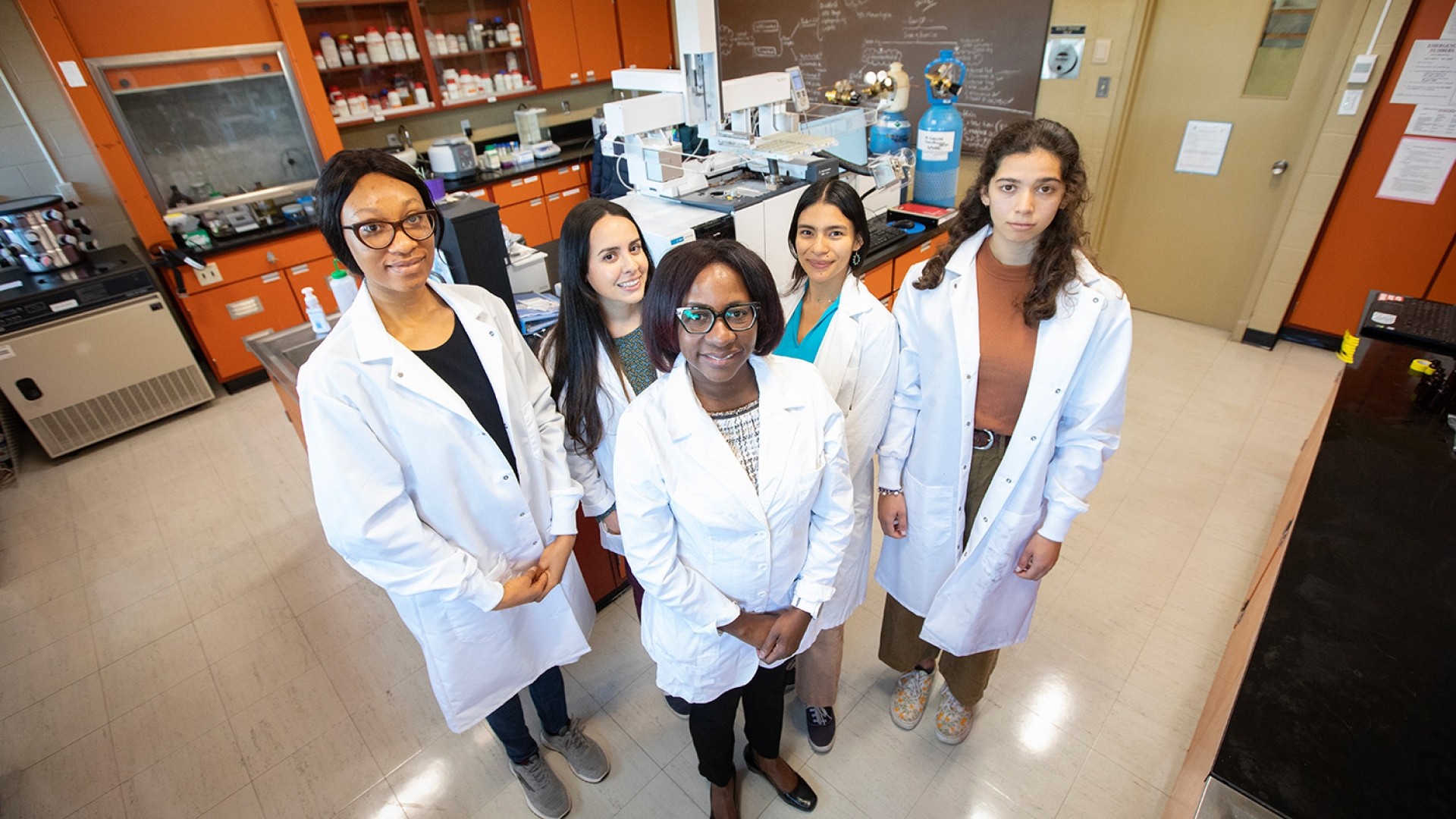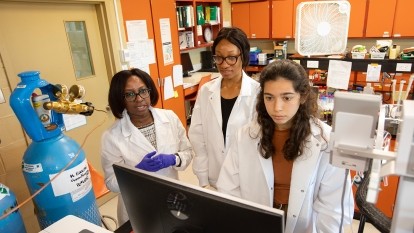
From her food research lab at St. Francis Xavier University, human nutrition professor Dr. Marcia English is leading an exciting research challenge that may directly impact the food on one’s plate—and help mitigate climate impacts of global seafood consumption.
Dr. English is the recipient of an international research award worth $120,000 U.S. over two years to investigate the use of plant proteins in alternative seafood products. The project was one of 21 plant-based applications chosen for funding by the Good Food Institute (GFI), a non-profit organization based in Washington, D.C.
Together with a team of food scientists from the University of Nottingham, Western University, Dalhousie University, and the University of Guelph, as well as undergraduate and graduate students in her lab, Dr. English is researching blends of plant protein sources to see if they can derive both a seafood flavour and nutritional profile that mimics Atlantic salmon.
“Globally, we’re having these challenges of overfishing,” Dr. English explains, “leading to destabilizing the ocean ecosystem, and even depletion of stocks.
“This is a big challenge. We’re not doing this in a sustainable way.”
Along with these challenges, fish can present other issues. It can be expensive for consumers to purchase, and some fish carry toxic chemicals such as mercury as well as those absorbed from microplastics in aquatic habitats. Fish are also among the most common food allergens.
“Alternative seafoods are an opportunity for people to have the benefits of traditional or conventional seafood products, but with a more sustainable approach and less demand on the environment,” she says.
“Of course, that comes with some challenges.”
That’s where Dr. English and her team come in.
Using food science, they’re investigating different novel blends of plant protein sources to mimic the seafood flavour and nutrition profile.

Proteins, which we need in our diet, are found in both animal-based (meat) and plant-based products (such as chickpeas, lentils, and beans). A key difference between the two sources, she says, is the amino acid composition. Some plant proteins are deficient in a few amino acids, and it’s recommended for these that one blends different sources to get the complete profile.
Less is known about the composition and the functionality of plant-based proteins (as animal proteins have traditionally been used in our diets) and it’s becoming increasingly important to understand as more people are changing their diets for a variety of factors and reducing the amount of meat they eat.
This has resulted in increased interest in companies developing plant-based ingredients, which are beneficial for the environment, she says, because of how efficiently plants produce high-value protein.
Since we don’t yet fully know how they function. Dr. English and her team are using different sources (pulses and algae, both microalgae and seaweeds) to extract protein and identify molecules in the protein blends that can meet the complex sensory and health attributes necessary for increased consumer acceptability.
The project carries important implications. Canada is a big producer of pulses and has a ready supply available. Pulses utilize soil bacteria to draw nitrogen from the air which reduces the need for fertilizers and results in lower greenhouse gas emissions. This research could therefore contribute to the economic growth of this industry and could contribute to the increased consumption of these healthy, sustainable foods, she says.
Along with working to see how close they can come to recreating the seafood flavour, they’re also trying to address how to create a similar nutrition profile to the omega 3 fatty acids and numerous health benefits found in fish.
Dr. English says they’re currently investigating adding lipids (such as flaxseed oil) that are rich in omega-3 fatty acids. Poly-unsaturated lipids are important for the nutritional quality of these formulations, she says, but they can also decrease the shelf life of products. Her team will also be investigating different approaches to ensure that the oxidative stability of these formulation blends is not compromised.
NOVEL RESEARCH
The research project is a fantastic opportunity for the undergraduate, masters, and PhD students working in her lab.
“We’re doing really novel research,” Dr. English says. “Only 21 projects globally were funded by this organization in this funding cycle. We’re the only Canadian group right now working on this project.”
The students also have opportunity to collaborate with researchers in different countries and at different institutions. “It’s really enriched the student experience with the resources available to them.”
It has also increased Dr. English’s network.
She recently attended a GFI conference in San Francisco where she and other researchers in attendance spoke on ways they can collaborate in the future. She is currently working with her team to prepare a review article: “Flavours of Conventional seafood and Alternative seafood: Recent trends and future perspective” for the journal: Comprehensive Reviews in Food Science and Food Safety.
The work also helps connect the researchers with industry.
“A lot of our work answers important questions,” she says. In this project in particular, those questions that have a broader impact and can address challenges that can benefit consumers and complement existing strategies in fisheries management.
“It’s interesting and important research, but it is also the opportunity to impact what goes on the consumer’s plate. It’s also contributing to the global challenge of sustainability and major impacts on the environment.”

